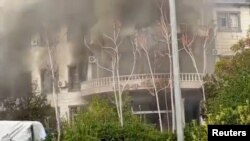A cautious calm has returned to a province in southern Syria following anti-government protests over the weekend that quickly turned violent when dozens of demonstrators stormed a government building, leading to clashes with security forces.
One civilian and one police officer were killed as a result of the violence Sunday in the province of Sweida, state and monitor groups reported. Several civilians were also wounded.
While the Druze-majority province has witnessed several protests against the government of President Bashar al-Assad during the country’s decadelong civil war, the recent demonstrations were likely among the deadliest in Sweida, observers said.
Rayan Marouf, editor of Sweida 24, a local news website, said the protests were triggered by the deteriorating economic situation and the government’s poor policies.
"Instead of addressing their demands, the regime responded with bullets and violence," he told VOA.
Despite the current calm, "some local activists are calling on people to continue their protests against the government, but I don’t think people will respond to those calls immediately, given that there has been killing on Sunday," Marouf said.
The Syrian government has described the protests as an insurgency supported by outlawed individuals.
The Druze, a religious minority, make up roughly 3% of Syria’s population. They are concentrated in Sweida and some neighborhoods of the capital, Damascus. During the country’s conflict, the Druze population has largely remained neutral, although occasional protests have erupted in their areas over government corruption and economic hardship.
Qutaiba Azzam, a member of a local Druze militia, told VOA that local Druze leaders are pressing the Syrian regime to hold accountable those who opened fire at people.
"We are against going towards violence," he said, "We call on the dignitaries of the province to do something in this regard. We don’t want our province to be embroiled in violence."
Experts said the scale of violence in the weekend protests was likely because of how dangerous they were viewed by the Syrian government.
"I think that the regime, in the south at least, has kind of adopted an attitude that there is a certain threshold of opposition that they're willing to not necessarily tolerate but exercise some level of restraint against," said Calvin Wilder, a Syria analyst at the New Lines Institute in Washington. "And then once it crosses a certain level, that they crack down in a very brutal way."
He said the government’s violent response to the protests in Sweida was similar to patterns seen elsewhere in southern Syria, particularly in the province of Daraa.
"In Daraa, where up until last summer there was always sort of an understanding that there was some level of opposition, some level of discontent, and that regime presence there was somewhat limited," Wilder told VOA. "Then when that started escalating into sort of larger protests that seemed like they might snowball as they were calling really explicitly for sort of anti-Assad slogans and banners, that sort of prompted a much larger and bloodier crackdown."
This story originated in VOA’s Kurdish Service.





